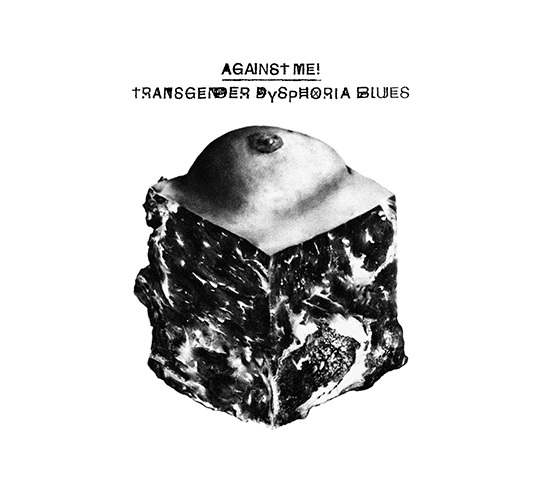 Against Me!’s latest album is the first to be released since the emergence of frontwoman Laura Jane Grace, formerly known as Tom Gabel, who came out as a transgender woman in 2012, and if you think they’re going to shy away from this even a little bit then you probably haven’t looked at the cover. This is Transgender Dysphoria Blues.
Against Me!’s latest album is the first to be released since the emergence of frontwoman Laura Jane Grace, formerly known as Tom Gabel, who came out as a transgender woman in 2012, and if you think they’re going to shy away from this even a little bit then you probably haven’t looked at the cover. This is Transgender Dysphoria Blues.
Grace has always been a very personal songwriter whose lyrics are colloquial and to the point – this is someone who’ll base a chorus around a clunky phrase like “the dynamic of the relationship never changes” or “protest songs in response to military aggression” because that’s the simplest, most natural way for her to get the point across, so it’s to be expected that she’d present the stories and emotions surrounding the recent changes in her life in a way that doesn’t mince words.
You’ve got no cunt in your strut
You’ve got no hips to shake
And you know it’s obvious
But we can’t choose how we’re made– “Gender Dysphoria Blues”
Grace takes full advantage of this opportunity to express her own present struggles as an out transgender individual, but also her past struggles as a confused kid who appears male, interacting with men or just looking at herself in the mirror and seeing something foreign. Grace’s straight-shooting lyrics are a foolproof delivery system to help the average cisgender listener comprehend the enormity of Grace’s discomfort and disassociation with her own body, and the way she’s looked at now as she walks down the street.
I’m drinking with the jocks
I’m laughing at the faggots
Just like one of the boys
Swinging my dick in my hand
All of my life, all of my life
Just like I was one of them– “Drinking With The Jocks”
You should have been a mother
You should have been a wife
You should have been gone from here years ago
You should be living a different life– “True Trans Soul Rebel”
Transgender Dysphoria Blues isn’t purely autobiographical. Just like she has in past albums like New Wave, Grace tells stories of suffering people on the edge, strung out and depressed, but there’s a new layer to the sadness as she sings about (probably) fictional transgender individuals at the end of their ropes, or at the end of their lives. Whether it’s intended or not, tracks like “Paralytic States” become protest songs of a sort, opening listeners’ ears and eyes to the suffering of people whose circumstances make them second-class citizens in their country and strangers in their own bodies.
She spent the last years of her life
Running from the boy she used to be
Cut her face wide open
Shaved the bone down thin
Plumped her lips up exaggerated
A fucked up kind of feminine
…Never quite the woman that she wanted to be– “Paralytic States”
Grace’s eponymous Blues may be the album’s main preoccupation, but roughly half of the record’s ten tracks seem to have no connection to the transgender experience. (At least I’m fairly certain that “Osama Bin Laden as the Crucified Christ” is unrelated.) “Dead Friend” eulogizes Against Me!’s late lighting designer John Paul Allison. “Two Coffins” and “Black Me Out” are harder to pin down, exactly – even Laura Jane “Because Of The Shame Associated With Vulnerability” Grace sometimes has to leave a little to the imagination of poetry.
Transgender Dysphoria Blues’ lyrics may be about confusion and transformation, but musically it’s still the same old Against Me! Any of these songs could slide right in amongst tracks on White Crosses or New Wave. Dysphoria Blues has all the hooky, alt/punk intensity you’ve come to expect from a band with an exclamation point in the name. The drums still drive, the guitars still pulse, and Grace still roars and growls, though perhaps less than on previous albums.
It’s uncertain whether or not Grace makes a conscious effort to sound more feminine vocally on this album. As a listener, it’s hard to separate my preconceptions and expectations from the final product. We’re all seeing her differently than we did two years ago, and so of course we’re hearing her differently, too. Does the new freedom of expression granted by her coming out allow her to sing from a different part of her heart, or is it just our willingness (or perhaps, for some listeners, unwillingness) to listen for this part of her that was hidden in the timbre of her voice? In this respect, this album may sound very different depending on the listener.
While Transgender Dysphoria Blues is a pretty unique album due to its context, apart from that it stands a solid, if not amazing, effort by one of America’s best rock outfits. The hooks are catchy and the lyrics passionate, if occasionally clunky. But more than in the case of most albums, context elevates this album to potentially historical significance. Transgender Dysphoria Blues will be remembered as Laura Jane Grace’s kick-ass, thought-provoking coming-out party.
Transgender Dysphoria Blues is out in stores today.


